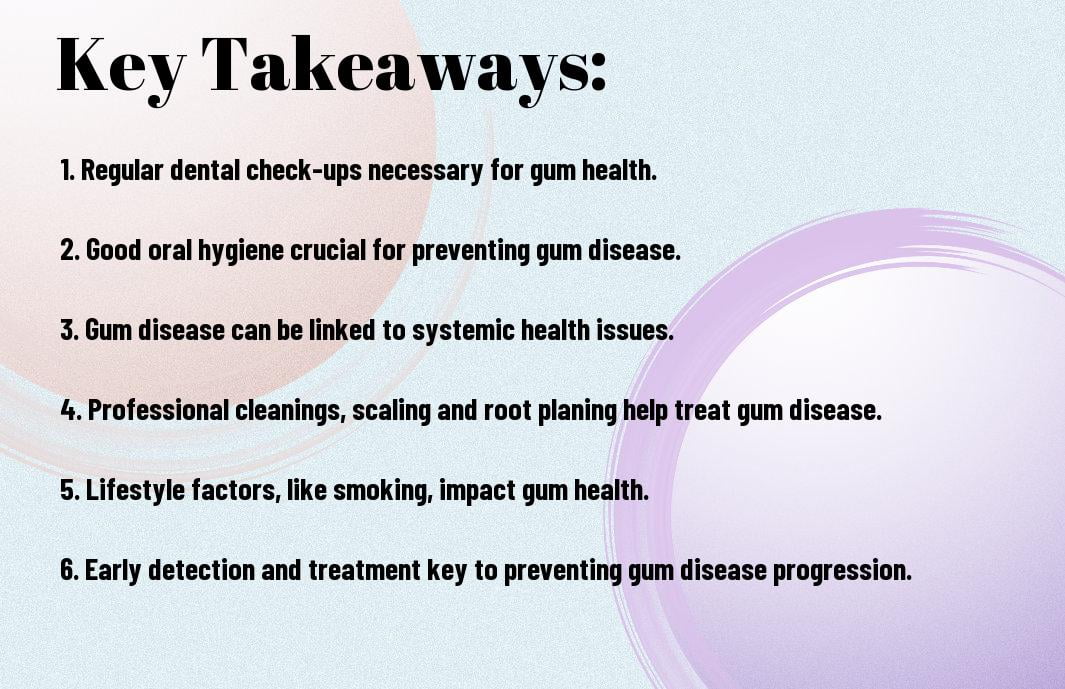Many people underestimate the importance of gum health in maintaining overall wellbeing. In this blog post, we will examine into the crucial role of periodontal care and treatment in preventing serious oral health issues such as gum disease and tooth loss. Understanding the signs, causes, and effective treatment options for periodontal problems is vital for preserving a healthy and beautiful smile. Let’s explore how proper gum health practices and regular visits to the dentist can make a significant difference in your oral health journey.
Key Takeaways:
- Importance of Gum Health: Periodontal health is crucial as it not only affects your teeth but also impacts your overall health. Proper gum care can prevent serious health conditions like heart disease and diabetes.
- Signs of Gum Disease: Be aware of symptoms like bleeding gums, bad breath, and gum recession. Early detection of gum issues is key in preventing progression to severe periodontal disease.
- Treatment Options: From professional cleanings to surgical procedures, there are various treatment options available for gum disease. Consult with a periodontist to determine the best course of action for your specific condition.
Understanding Periodontal Disease
Definition and Stages of Gum Disease
Understanding periodontal disease is crucial for maintaining good oral health. This condition, also known as gum disease, is an inflammatory response to bacterial plaque accumulation on the teeth and gums. Gum disease progresses through different stages, starting with gingivitis, where the gums become inflamed and may bleed easily. If left untreated, it can advance to periodontitis, where the inner layer of the gum and bone pull away from the teeth, forming pockets that can become infected.
Common Risk Factors and Causes
Any individual can develop gum disease, but certain factors increase the risk. Poor oral hygiene, smoking, hormonal changes in women, diabetes, genetic predisposition, stress, medications, and illnesses are common contributors to gum disease.
- Poor oral hygiene and smoking are the primary risk factors for gum disease.
- Diabetes and genetic predisposition can also increase susceptibility to gum disease. Knowing these risk factors can help individuals take proactive steps to prevent gum disease.
To prevent the progression of gum disease and maintain good oral health, it’s vital to practice proper oral hygiene habits. Regular brushing, flossing, and dental check-ups can help remove plaque and prevent gum disease. Seeking early treatment from a dental professional is key to managing gum disease effectively and avoiding potential complications. Any symptoms of gum disease, such as red or swollen gums, bleeding, or persistent bad breath, should not be ignored, and prompt action should be taken to address the issue. By understanding the causes and stages of gum disease, individuals can take control of their oral health and prevent the development of more severe periodontal conditions.
The Impact of Gum Health on Overall Wellness
Connections to Systemic Health Conditions
Any neglect or poor maintenance of gum health can have far-reaching consequences beyond the mouth. Research has shown strong links between gum disease and several systemic health conditions, including diabetes, heart disease, respiratory infections, and even pregnancy complications. The inflammation and bacteria from periodontal disease can enter the bloodstream, triggering or exacerbating these conditions.
The Role of Inflammation in Periodontal Disease
With periodontal disease being a chronic inflammatory condition, the body’s response to the infection can lead to significant damage not only to the gums but also to the surrounding bone structures supporting the teeth. Untreated periodontal disease can result in tooth loss and may contribute to the worsening of other inflammatory conditions in the body.
Health experts emphasize the importance of controlling inflammation in the gums through regular dental visits, proper oral hygiene practices, and timely treatment of any signs of gum disease. By addressing inflammation early and effectively, individuals can not only preserve their oral health but also reduce the risk of developing associated systemic health problems.
Preventative Measures and Daily Care
Proper Oral Hygiene Techniques
Many individuals underestimate the significance of proper oral hygiene in maintaining gum health. Brushing twice a day with a fluoride toothpaste, flossing daily, and using an antimicrobial mouthwash can greatly reduce the risk of gum disease. It is necessary to brush gently in circular motions to effectively remove plaque and food particles that can lead to inflammation and gum problems.
The Importance of Regular Dental Checkups
Oral hygiene encompasses more than just daily brushing and flossing. Regular dental checkups are crucial for preventing and detecting gum disease in its early stages. During a dental exam, the dentist can assess your gum health, perform a professional cleaning to remove tartar buildup, and provide personalized recommendations for at-home care.
Hygiene Tip: Skipping regular dental checkups can lead to undetected gum disease, which can progress to periodontitis, a more severe form of gum disease that can result in tooth loss and jaw bone damage if left untreated.
Advanced Periodontal Care and Treatment Options
- Non-Surgical Periodontal Therapies
- Surgical Interventions and the Role of Dentistry Specialists
Non-Surgical Periodontal Therapies
An necessary part of advanced periodontal care involves non-surgical therapies that aim to treat gum disease before it progresses to a more severe stage. Scaling and root planing are common procedures that involve deep cleaning of the teeth and roots to remove plaque and tartar. This helps to eliminate bacteria and inflammation, allowing the gums to heal and reattach to the teeth properly.
Surgical Interventions and the Role of Dentistry Specialists
For more severe cases of periodontal disease, surgical interventions may be necessary to restore gum health. Dentistry specialists, such as periodontists, play a crucial role in treating advanced gum disease. They are trained to perform gum grafting, bone grafting, and flap surgery to repair damaged tissue and bone, ultimately preserving the health and integrity of the gums and supporting structures.
With proper diagnosis and treatment, patients can achieve significant improvements in their gum health and overall well-being. Seeking early intervention and following a comprehensive care plan prescribed by dental professionals are key to successfully managing and treating periodontal disease.
Innovations in Periodontal Treatment and Maintenance
The Evolution of Periodontal Tools and Technologies
After years of research and development, the field of periodontics has seen significant advancements in tools and technologies utilized for the treatment and management of periodontal disease. The evolution of periodontal tools has led to more precise and efficient treatments, resulting in better outcomes for patients.
Long-Term Management Strategies for Periodontal Health
For long-term management of periodontal health, it is important to implement effective strategies that not only treat existing issues but also prevent future complications. Tools and technologies like advanced imaging systems, laser therapy, and targeted drug delivery systems have revolutionized the way periodontal disease is managed.
Management of periodontal health requires a combination of professional treatments and diligent at-home care. Regular dental visits for professional cleanings and check-ups are crucial in monitoring the progress of treatment and addressing any new concerns. Additionally, maintaining a strong oral hygiene routine, including brushing, flossing, and using antimicrobial mouth rinses, is key to preventing recurrence of periodontal disease.
Conclusively
Understanding the importance of gum health is important for maintaining overall well-being. Periodontal care and treatment play a crucial role in preventing gum disease and its associated complications. By focusing on proper oral hygiene, regular dental check-ups, and early intervention when necessary, individuals can effectively protect their gum health. By following these insights into periodontal care, you can take proactive steps to safeguard your smile and preserve your oral health for years to come.
FAQ
Q: Why is gum health important?
A: Gum health is crucial because it directly impacts your overall health. Healthy gums are imperative for maintaining strong teeth and preventing issues like tooth decay and tooth loss. Additionally, poor gum health has been linked to serious health conditions such as heart disease and diabetes.
Q: What are the signs of gum disease?
A: Common signs of gum disease include red, swollen, or tender gums, bleeding while brushing or flossing, persistent bad breath, receding gums, and loose or shifting teeth. If you notice any of these symptoms, it’s important to see a dentist for a proper evaluation and treatment.
Q: How is gum disease treated?
A: The treatment for gum disease depends on the severity of the condition. In the early stages, thorough professional cleanings and improved oral hygiene at home may be sufficient. However, advanced cases may require procedures like scaling and root planing, laser therapy, or surgery. It’s imperative to work closely with your dentist to create a personalized treatment plan for your specific needs.







